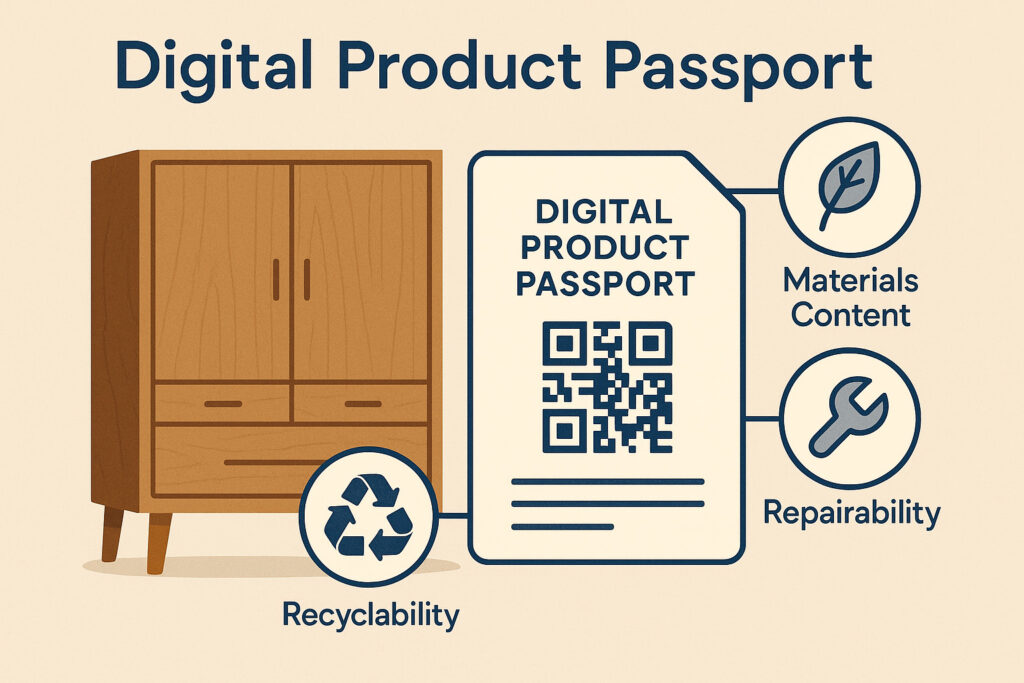
Should Australia introduce a Digital Product Passport?
Digital Product Passports (DPPs) have been hailed as a game changer for sustainability and transparency and are soon to be introduced to the EU.
The ESPR (Ecodesign for Sustainable Products Regulation), which mandates the DPP, was adopted in July 2024 following the European Commission releasing a detailed timeline for DPP adoption across various product categories in April 2025.
The (ESPR) Working Plan for 2025–2030 outlines the specific product groups that will be subject to new ecodesign and information requirements, including the implementation of DPPs. While the exact timeline may vary by product category, businesses supplying to the EU should prepare for compliance to be required between 2026 and 2030.
The ESPR Working Plan prioritises several product categories for the initial phase of DPP implementation, based on environmental impact and potential for circularity. These categories include textiles and apparel, furniture and mattresses, iron and steel, aluminium, and tires. The plan sets out a timeline for the adoption of DPPs for these products, with enforcement expected to begin between 2026 and 2029.
By 2030, the goal is for all products sold in the EU to be covered by Digital Product Passports.
While the European Union is moving towards making DPPs compulsory for nearly all products by 2030, Australia is exploring similar concepts to enhance product transparency and support a circular economy. Discussions and initiatives are underway in Australia regarding the adoption of DPPs, but there is no mandated system currently in place.

What Is a Digital Product Passport?
A Digital Product Passport is an electronic record that consolidates essential information about a product’s identity, compliance, safety, and sustainability. It serves as a digital twin of a physical product, capturing data from its origin to its end-of-life. This includes details such as material composition, carbon footprint, repairability, and recyclability. The DPP enhances supply chain transparency and traceability, benefiting consumers, regulators, and businesses alike.
Why Is It Being Introduced?
The DPP is part of the EU’s broader strategy to promote a circular economy and reduce environmental impact. By providing detailed product information, the DPP empowers consumers to make informed choices, supports businesses in demonstrating compliance, and aids regulators in enforcing sustainability standards. It also facilitates product reuse, repair, and recycling, aligning with the EU’s goal of achieving climate neutrality by 2050.
Key Features and Requirements
The DPP must adhere to several technical and informational standards to ensure interoperability and reliability:
✅Unique Product Identifier: Each product must carry a unique identifier, such as a QR code, NFC chip, or RFID tag, to access its digital passport.
✅Standardised Format: Data should be stored in a machine-readable, open format, ensuring compatibility across systems.
✅Comprehensive Information: The passport should include data on material composition, carbon footprint, repair instructions, recycling information, and certifications.
✅Compliance with ISO Standards: The DPP must comply with ISO/IEC 15459:2015 to ensure global interoperability.
In Australia, several pilot projects and industry collaborations are testing DPP-like systems. These initiatives indicate a growing interest in DPPs within the Australian market, particularly among businesses seeking to align with global sustainability trends and enhance supply chain transparency.
While there is no national mandate for DPPs in Australia, some legislation has been introduced which aims to promote a circular economy. For example, the Circular Economy Act 2023, legislated in the ACT, focuses on reducing waste and promoting the design and manufacturing of resource-efficient products. Or the voluntary Environmental Product Declaration (EPD) system which is independently verified and registered (see more on this here).
The EU’s impending DPP regulations are likely to influence Australian businesses, especially those exporting to European markets. As global supply chains become more interconnected and consumers increasingly demand transparency, Australia is likely to adopt similar regulations. The success of pilot projects and the growing recognition of the benefits of DPPs could pave the way for broader adoption across the country.
While Australia has not yet implemented mandatory Digital Product Passports, there is a clear trend towards exploring and adopting these systems. Any introduction of a DPP is likely to impact on our cabinet making and renovation industries, particularly as sustainability and transparency in product sourcing become more critical.
A DPP would provide detailed information about the materials used in products, such as timber, wood panels, adhesives, finishes, and hardware. This transparency can impact:
✅Sourcing and Supply Chain: Designers, cabinet makers and renovators may need to source materials from suppliers who can provide detailed DPPs for their products. This would ensure that the materials are sustainably sourced, comply with environmental regulations, and meet recycling or reuse standards.
✅Compliance with Sustainability Standards: As sustainability becomes more central to industry practices, knowing the material composition helps businesses align with regulations and consumer demand for eco-friendly options.
One of the core elements of a DPP is data on the carbon footprint and environmental impact of a product. This is especially relevant to the interior design, cabinet making and renovation industries due to the environmental concerns around manufacturing and disposal of products such as:
✅Timber and Wood Products: If cabinet making companies source timber or wood products, knowing the carbon footprint of these materials can help them make more informed purchasing decisions and promote sustainable practices.
✅Recyclability of Materials: DPPs may also indicate how easily a product can be recycled or repurposed, which is crucial for specification within renovation projects where materials might need to be reused or recycled.
A DPP would typically include details about a product’s durability, care instructions, and expected lifespan. This information could impact:
✅Long-term Value: Designers, builders and cabinet makers could benefit from accessing data on the lifespan of materials and products, aiding in the selection of durable options for clients.
✅Maintenance Requirements: Cabinet makers and builders may need to advise clients on how to maintain products to extend their life. Having a detailed DPP could help them provide more accurate and informed maintenance plans.
Designers, cabinet makers and renovators would benefit from DPPs that indicate how to properly dispose of or recycle materials at the end of a product’s life cycle. This could lead to:
✅Reduced Construction Waste: With accurate data on the recyclability of products, designers and renovators can be more mindful of reducing waste during renovation projects.
✅Cost Savings on Disposal: Knowing how to dispose of or recycle materials efficiently can help businesses save money on waste management while adhering to environmental standards.
As consumers become more aware of the environmental impact of their purchases, having access to DPPs can help designers, cabinet makers and renovators differentiate their offerings. Key benefits include:
✅Marketing Sustainable Choices: Cabinet makers can use the data from the DPP to promote sustainable and eco-friendly materials, positioning their business as a green alternative in a competitive market.
✅Transparency for Clients: Providing clients with detailed product information helps build trust and can be a valuable selling point, especially among environmentally-conscious consumers.
In Australia, a Digital Product Passport would have the potential to foster a transition toward greater sustainability, circularity, and transparency. Whether it’s ensuring that products comply with environmental regulations, sourcing sustainable materials, or reducing waste in renovations, the DPP would become a key tool in making the industry more efficient, eco-friendly, and consumer-conscious.
